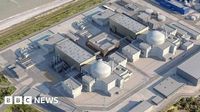The UK government has announced a major £14.2 billion investment to build the Sizewell C nuclear power station on the Suffolk coastline, marking one of the most significant steps in the country’s energy strategy in recent years. This investment, confirmed on June 10, 2025, aims to create up to 10,000 direct construction jobs and thousands more in supply chain roles, while generating enough electricity to power six million homes. The project is being hailed by government officials as a cornerstone of a "golden age of clean energy," but it also faces sharp criticism and concerns over costs, environmental impact, and delays.
Sizewell C is planned to be a two-reactor nuclear power station located adjacent to the existing Sizewell B plant, which has been operational since 1995, and near the decommissioned Sizewell A site. The French state-owned energy company EDF holds a 15% stake in the project and has been leading preparatory work, including contracts worth approximately £330 million with local firms. Once operational, the plant is expected to employ around 900 people.
Energy Secretary Ed Miliband described the investment as a "landmark decision" that will "kickstart" economic growth and help tackle the climate crisis by reducing the UK's reliance on "insecure, expensive and volatile fossil fuels." Speaking to the BBC, Miliband emphasized that the project is part of the government's long-term vision for energy security and affordability. "We need new nuclear to deliver a golden age of clean energy abundance, because that is the only way to protect family finances, take back control of our energy, and tackle the climate crisis," he said.
Chancellor Rachel Reeves echoed this sentiment, calling it the "biggest nuclear building programme in a generation." She stressed the potential for Sizewell C to create thousands of jobs and apprenticeships, supporting local economies and providing a boost to the UK’s energy infrastructure. The government has already invested £3.6 billion in the project prior to this announcement, bringing total public investment to £17.8 billion when including previous commitments.
The Sizewell C plant is designed to replicate the Hinkley Point C nuclear power station in Somerset, which has faced significant challenges. Hinkley Point C, the UK’s first new nuclear plant since 1995, has been plagued by delays and cost overruns, with its completion pushed to the early 2030s and expenses ballooning billions over initial estimates. The government and EDF remain confident that lessons learned from Hinkley will enable Sizewell C to be built more efficiently and cost-effectively.
Yet, despite the government’s enthusiasm, the project has not secured a "Final Investment Decision" as of June 2025. This critical step requires full funding, including commitments from private investors. While ministers and EDF have indicated that numerous potential investors have expressed interest and that agreements are close, the final funding model remains unresolved. The government expects to make this decision in the summer of 2025.
Opposition voices are loud and persistent. Alison Downes, director of the campaign group Stop Sizewell C, condemned the government's funding announcement, warning that taxpayers’ money is being committed prematurely. "There still appears to be no Final Investment Decision for Sizewell C, but £14.2 billion in taxpayers' funding, a decision we condemn and firmly believe the government will come to regret," she said. Downes expressed fears that the project would add to consumer energy bills and likened the investment to "HS2 mark two," referencing the controversial and over-budget high-speed rail project.
Environmental concerns also loom large. Campaign groups including Stop Sizewell C and Together Against Sizewell C, along with the Royal Society for the Protection of Birds, have protested against the plant, citing potential harm to local wildlife and natural habitats. Sizewell C developers have responded by highlighting efforts to protect displaced animals through the creation of new nature reserves and rehoming programs, but critics remain wary.
Beyond environmental issues, opponents argue that nuclear projects like Sizewell C are "too slow" to address the urgent demands of climate change and that the funds could be better spent on other renewable energy technologies or social priorities. The project's timeline is long: once construction begins, it is expected to take at least a decade to complete, with operations possibly commencing in the 2030s.
Historically, nuclear power has played a significant role in the UK's energy mix, generating around 25% of electricity in the 1990s. However, this share has declined to about 15%, with most of the existing nuclear fleet scheduled for decommissioning by 2030, except for Sizewell B. The government views Sizewell C as vital to replenishing the nuclear sector and meeting net zero carbon targets by 2030. Unlike fossil fuel plants, nuclear power does not emit greenhouse gases during operation, making it an attractive option for clean, reliable energy.
The Sizewell C project also has social and economic dimensions. During construction, it is expected to provide up to 10,000 jobs and 1,500 apprenticeships, offering a significant boost to the local economy of East Suffolk. The plant recently announced plans to open a post-16 college in Leiston to train its future workforce, demonstrating a commitment to community engagement and skills development.
Alongside Sizewell C, the government is investing £2.5 billion over five years in research and development for fusion energy and strengthening its defence nuclear sector, including projects at HMNB Clyde and Sheffield Forgemasters. These investments indicate a broader strategy to maintain the UK’s position in advanced nuclear technologies and energy security.
Despite the controversies and uncertainties, government officials remain steadfast in their belief that Sizewell C is a necessary step for the UK's energy future. Miliband reflected on his long involvement with the project, recalling that in 2009 he identified Sizewell as a potential site for nuclear development. "I didn't expect it would be me back doing it and making it happen," he said, underscoring the project's importance in the national energy agenda.
As the government prepares to unveil its Spending Review, Sizewell C stands as one of the most ambitious and contentious infrastructure projects in the UK. Whether it will fulfill its promise of clean energy abundance and economic revitalization or become another costly, delayed venture remains to be seen. What is clear is that the decisions made in the coming months will shape the country's energy landscape for decades to come.




